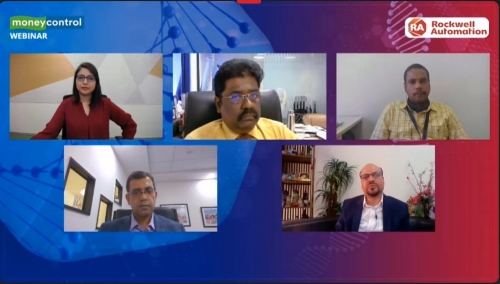Pharma industry is ready to embrace technology platforms with a keen focus on automation in manufacturing and digital health investment.

As the pharmaceutical sector expands its base in India, it will need to focus on the adoption of next-generation technologies. This was concluded by the top experts while speaking at the webinar, ‘Make in India: Pharmacy of the world’ as a part of an E-Conference titled ‘Manufacturing: Powering Economic Recovery’ organized by Moneycontrol and CNBC18.
As per Anjani Kumar, Chief Information Officer, Strides Pharma, there has to be an increased role of the private sector in innovation and R&D. He also raises the issue of the slow cycle of investments and wants the government to pay attention towards IP protection and use blockchain tech to take care of infringement. “There were multiple disruptions in the supply chain due to the pandemic and many Indian companies who were reluctant earlier, have lapped up digital technologies. Software such as AIML is used for quality records, besides MES as compliance is important. Even the regulators are using them to analyze and come to a decision quickly. Earlier what used to take eight years has taken a few months to achieve using new technologies and data on the R&D side, the best example being vaccines.”
Compared to a decade ago we are nicely positioned to go over the tipping point, opines Sreeji Gopinathan, Global CIO, Lupin Limited while talking about the capabilities in pharma research and manufacturing. Gopinathan feels leadership of the life science industry is taking proactive steps in that direction. “There is a significant volume of generics we do and now is the time to take steps for molecule development. We haven’t done much in terms of leveraging data and in terms of arrangement system, I think it is where we need to start focusing. This is an area where a lot of energy focus has to be put in. And it is good that just like other functional areas, this too is being discussed.”
Sharing a comparative account of how things have evolved during the pandemic, Arvind Kakru, Country Head, End-User and EPC business, Rockwell Automation says, “Thanks to digital technologies, now patients are more connected with their doctors. There have been tremendous strides in patient care and rather it is the proper utilization of data that is transforming the care. The pandemic has also led to a focus on best practices in securing compliance in pharma. This industry needs faster time to market as the cost of failure is high here than in others. From consumer and manufacturing side things are getting picked up.”
Lack of enough innovation puzzles E. Esakki Ramkumar, Vice President, Manufacturing Operations, Essai Pharmaceuticals India who feels that despite the fact that India is the manufacturer of 50% of vaccines globally, only a few innovative drugs are discovered and produced here. “COVID 19 has given a new kind of opportunity. Biosimilar drugs are going to be big revenue generators to the extent of overall 25% of revenue. Collaboration within institutes, R&D funding are the key factors. In R&D, companies have started using PAT tools where you can see real-time analysis and improve your batch. From a tech point of view, now few companies are working on improving continuous manufacturing processes.”
J Jayaseelan, Chairman, The Indian Pharmaceutical Association believes the pharma supply chain has performed well. “Despite the challenges during the lockdown, we overcame them and not only provided to Indian population but also globally. In terms of supply, we are now catering to every market including our neighboring countries and western markets. The latest PLI scheme from the government aims to decrease our dependency. They have given the list of bulk drugs to be produced and companies have done a wonderful work of identifying what is important which was not the case earlier.”
Cybersecurity and blockchain critical yet slow adoption
Providing a peep into the issues around cybersecurity in the context of pharma, Dilip Sawhney, MD, Rockwell Automation mentions, “There are a vast array of points which make them easy for people who have malicious intent to disrupt your enterprise. Yet at the same time, there is a lot of help available. Besides availing security solutions that provide layers of protection, good hygiene is required.”
On the blockchain, Sawhney feels it has a little bit of complexity but is critical. ‘Besides things related to mobility, it is important from a consumer standpoint such as providing 24*7 home diagnostics and other digital health technologies.
Ramkumar believes tracing and tracking are the biggest challenges to tackle counterfeit products in the pharma sector. “Blockchain is being tried but the efforts in this direction are too slow. It may not be a success until you bring the whole ecosystem into it and unless the government agencies mandate it. Still, a few years away, there is a need for a consortium to take it forward.”
Echoing similar views, Kumar agrees that there are hurdles in blockchain adoption and it will take time to build confidence. “Right now supply chain is managed through track and trace and MES.
As per Gopinath, India has built its capabilities as a country and Indian talent in including information technology is everywhere. “If we make full use of our talent, learning digitalization in pharma and research innovation won't be a problem. In the days to come, new age digital technologies such as Artificial intelligence are set to make things easier across the supply chain and distribution, R&D, manufacturing, and marketing."
Register Now to Attend NextGen Chemicals & Petrochemicals Summit 2024, 11-12 July 2024, Mumbai

Subscribe To Our Newsletter & Stay Updated